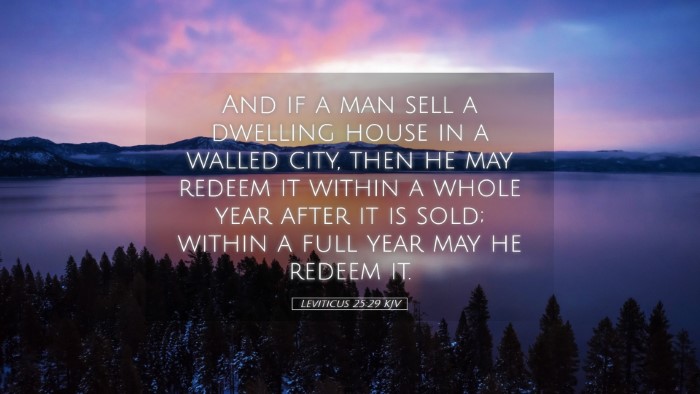Commentary on Leviticus 25:29
Verse Reference: Leviticus 25:29 - "And if a man sell a dwelling house in a walled city, then he may redeem it within a whole year after it is sold; within a full year may he redeem it."
Contextual Understanding
The Book of Leviticus, primarily focused on laws and rituals, underscores the holiness of God and the regulations for maintaining the holiness among His people. Chapter 25 details the Sabbatical Year and the Year of Jubilee, key components of the social and economic structure of ancient Israel.
This specific verse discusses property rights, particularly regarding dwelling houses in walled cities. It offers insight into the obligations and rights concerning property and redemption.
Insights from Matthew Henry
Matthew Henry emphasizes the merciful provision that God has made regarding the redemption of property, reflecting His desire for justice and equity among His people. Henry notes that selling a house reflects the affliction and distress that may have fallen upon a family. The ability to redeem the house within a year demonstrates God's intention to ensure that families can retain their possessions, emphasizing His care for their well-being.
Moreover, Henry elaborates on the significance of 'the walled city.' Houses in these cities were intricated with social status and security. The year-long window for redemption acts as a safeguard against destitution and serves as an acknowledgment of the integral role of community and family heritage within Israelite society.
Insights from Albert Barnes
Albert Barnes highlights the practical aspects of the verse, explaining that this provision reflects rational social justice. In the face of economic stress, individuals may feel compelled to sell their homes for survival. The mandate that a dwelling can be redeemed within a year helps to restore stability to families and reinforces the principle of land and property retention within families.
Barnes points out that the stipulation applies specifically to walled cities—a determinant of wealth and security. In his examination, he notes that the provisions for redemption are designed to maintain not only individual family integrity but also the communal and tribal land boundaries that were crucial in ancient Israel.
Insights from Adam Clarke
Adam Clarke's commentary looks at the theological implications of this command. He posits that this law embodies God's overarching theme of redemption—highlighting the continuous opportunity for restoration. Clarke interprets the 'walled city' as representing both literal security and spiritual separation from less secure, rural areas. The protection of property serves as a means to prevent destitution and reflects God’s concern for the social order.
Clarke further associates the redemption concept with the coming of Christ, referring to Him as our ultimate Redeemer. Just as houses could be redeemed within a year, believers have access to redemption through faith, commemorating the constant opportunity for reconciliation with God.
Theological Themes
-
Redemption: The theme of redemption is central, suggesting that God provides means for recovery from loss, both economically and spiritually.
-
Justice and Equity: The laws reflect a divine justice system, ensuring that the vulnerable are not left destitute, which is critical for pastoral teaching on community responsibility.
-
Family and Heritage: The need to maintain familial properties underlines the importance of heritage and community in God's design for His people.
-
Divine Provision: The provision for redemption reflects God’s loving care and desire for restoration, highlighting His covenantal relationship with His people.
Practical Applications for Today
For modern believers, Leviticus 25:29 serves as a reminder of the importance of justice and equitable treatment in community practices. Pastors can draw parallels between the ancient laws and contemporary issues of property rights, economic disparity, and community support.
Furthermore, the concept of redemption offers a profound insight into spiritual life. Just as families could reclaim their homes, believers are encouraged to seek out their spiritual inheritance through Christ, understanding that no distress is beyond redemption.
Conclusion
Leviticus 25:29 encapsulates rich theological and practical insights vital for today’s scholars, students, and ministers. By synthesizing the insights from notable commentators such as Matthew Henry, Albert Barnes, and Adam Clarke, we see a comprehensive understanding of the significance of redemption, justice, and divine provision embedded within God’s laws. This verse not only reinforces God's commitment to His people throughout generations but also reminds us of our responsibility towards fairness and compassion in our communities.


